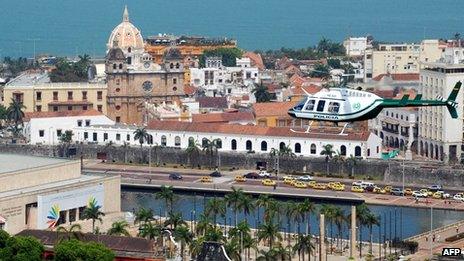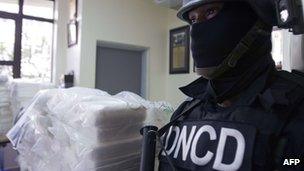Summit set to highlight changing US-Latin America ties
- Published

Security is tight for the summit in Cartagena on Colombia's Caribbean coast
The colonial Colombian city of Cartagena has become, once again, a fortress as it prepares to host the Summit of the Americas.
Submarines and warships are protecting the bay, aeroplanes and helicopters are patrolling the Caribbean sky.
Only those involved with the summit are being allowed inside the walled old town, where leaders of 33 countries in the western hemisphere, excluding Cuba and Ecuador, are meeting this weekend.
For Colombia, the summit offers a great opportunity to show its best face and all the progress it has made since the violence-ravaged 1990s.
But, more importantly, the host country also aims to reassert itself as an increasingly influential regional player, ideally placed to bring Latin America and the United States closer together after years of drifting apart.
Indeed, Washington's influence in regional affairs is a shadow of what it once was.

Drugs and the violence they cause are of major concern to the region
"Brazil is now Latin America's dominant economic power. Its influence in regional affairs, especially in South America, rivals that of the United States," said <link> <caption> a report this month from the Inter-American Dialogue, </caption> <altText>IAD2012PolicyReportFINAL</altText> <url href="http://www.thedialogue.org/PublicationFiles/IAD2012PolicyReportFINAL.pdf" platform="highweb"/> </link> a Washington-based think-tank.
"Latin America and the Caribbean have formed several new regional groupings in recent years... and the most significant of the new organizations have tellingly excluded the United States and Canada," the report says.
China's economic rise and the efforts of Latin American countries to diversify their markets have also significantly reduced the clout of the US.
China is already the most important trading partner for Brazil, Chile and Peru.
Tough topics
The diminishing influence of Washington in the region is also evident in the agenda of the meeting, the sixth of its kind.
Officially, the summit is all about "connecting the Americas" in order to become "partners in prosperity", and so includes subjects such as shared infrastructure and IT access.
But there will also be discussions on issues that US President Barack Obama would certainly have preferred not to approach in an election year.
The US opposition to the presence of Cuba is one of those issues.
A long-sought debate on the effectiveness of the current war on drugs is another.
That debate is significant, because for the first time sitting heads of state have been asking out loud for "market-oriented solutions" to be considered, including the possibility of legalising certain drugs.
"We have seen that the strategy that has been pursued in the fight against drug trafficking over the last 40 years has failed," Guatemalan President Otto Perez Molina recently said.
And many Latin American countries feel they are paying a disproportionate price for it, in blood.
Being a major drug-trafficking route has turned Central America into the most violent region in the world.
Some 50,000 people have died in Mexico since 2006 when the government launched a crackdown on the drug gangs.
It is emblematic that the discussion has been arranged by, and will be taking place in, Colombia, a staunch US ally that for all its progress in the war on drugs continues to suffer from an internal conflict largely sustained by the illegal trade.
Washington, however, has already made clear that it opposes legalisation.
And the proximity of the US elections will certainly affect the debate, which is likely to take place mostly behind closed doors.
That said, the US cannot afford completely to dismiss Latin America's concerns without risking further damage to their relationship.
The director of the <link> <caption>US-based Drug Policy Alliance</caption> <altText>Drug Policy Alliance</altText> <url href="http://www.drugpolicy.org/" platform="highweb"/> </link> , Ethan Nadelmann, who has being advising some Latin American leaders on the issue, believes Cartagena could be "the beginning of a multi-year, multi-decade process" leading to important progress in drug-policy reform.
"The biggest risk is that some people in the media, combined with the US government and others, will try to label all talk about reform as outright legalisation," he told the BBC.
But, according to Mr Nadelmann, the presidents that are pushing forward the discussion "are thinking about the issue in a much more sophisticated and nuanced way than has ever been true of anybody in a major leadership position".
"This is a historic moment. It is not possible to put the genie back in the bottle," he said.
- Published25 March 2012
- Published9 April 2012
- Published5 May 2011